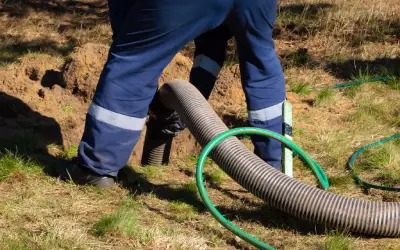
We’re Puget Sound Septic, and we’re proud to serve King County WA and the surrounding area whenever you need septic pumping services. As you might guess, we get a lot of questions about septic pumping, how it works, and what to expect.
To make it easy for everyone, we decided to compile some of our most commonly asked questions here in this Septic Tank Pumping FAQ section. If you have questions, there’s a good chance you’ll find it here. If not, please reach out to us anytime with any questions about septic tank pumping in the Seattle area!
Frequently Asked Questions About Septic System Pumping
- What’s that smell?
- How often should a septic tank be pumped out?
- How do I tell if my septic tank is full?
- What happens if you never pump out your septic tank?
- How long do septic tanks last?
- When should you not pump your septic tank?
- Can you flush a toilet while your septic tank is being pumped?
- How much does it cost to pump a septic tank?
- What happens to the waste you pump out?
- Can you locate my tank if I don’t know where it is?
- Will getting my septic tank pumped damage my lawn?
- How long does it take to pump a septic tank?
- Why does my septic tank refill with water so soon after pumping?
- How can I keep my septic tank in excellent shape between pumpings?
- Do I need to be home for my septic tank pumping?
What’s that smell?
If you get a whiff of something unpleasant and suspect your septic tank is the culprit, it may be sewer gases escaping.
Occasional brief smells can be normal with any septic system, but if an odor doesn’t go away, it’s worth investigating. Here’s what may be causing the smell:
- Spill over from the tank into your yard
- Bacteria in the tank not at proper levels
- Overfilled or under-pumped tank
- Clogged or blocked pipes
- Damaged or improperly installed vent pipes
- High water usage or hydraulic overload
- Cracks or leaks in the tank or lines
- Infrequent or improper maintenance
- Poor drainfield function
As you can see, it can be a number of things – so if you’re persistently asking yourself, “What’s that smell?”, be sure to call your friends at Puget Sound Septic. We offer expert septic tank inspections.
Q. How often should a septic tank be pumped out?
We recommend septic tank pumping at least once every two to five years.
Yes, that’s a wide range – it all comes down to how much wear you’re putting on the tank. If you have a new tank, live alone, and don’t use a garbage disposal, you’re probably fine waiting until every four or five years. Whereas if there are several of you living in the same dwelling serviced by an aging septic tank, you should get it pumped every couple of years.
It comes down to four main factors: septic system age, septic tank size, household size, and whether you use a garbage disposal. Garbage disposals put a lot of strain on septic tanks.
Q. How do I tell if my septic tank is full?
If your septic tank is full, you will most likely start noticing warning signs that it needs to get pumped.
- The first sign will likely be that your drains and toilets are backed up. This is because there’s not enough space in your septic tank to take on more waste efficiently.
- You may start to notice foul sewage odors around the house or outside.
- Finally, there may also be pooling water outside near the drainfield. Or if the water is unable to reach the surface, you may notice suspiciously lush grass in the area of your drainfield.
Q. What happens if you never pump out your septic tank?
If you never pump out your septic tank, you’re essentially asking for a sewage disaster. Your drains and toilets will back up. It will smell awful. Your plumbing will cease to function properly.
Your septic tank may start to leak and you’ll notice pooling water or lush grass – this is a major warning sign you must do something now.
If allowed to progress, the next stage is a full rupture. Your septic tank will burst, contaminating the surrounding land and maybe even the groundwater (and you could be forced to pay for remediation). That’s not to mention the extensive damage to your home.
Q. How long do septic tanks last?
With good maintenance, septic tanks can last for about 20 to 40 years. Of course, it all comes back to how much strain you’ve put on the tank during its lifetime and whether you’ve kept up with maintenance practices. If your tank is well-maintained, it should give you a long life. If you’ve skipped maintenance or forgone routine pumping, it may not be on the shorter end of that range.
Most septic tanks are either concrete or steel and concrete tanks tend to outlive steel tanks.
Q. When should you not pump your septic tank?
Avoid having your septic tank pumped if you’re experiencing flooding in your home that’s possibly related to the tank. Opening your tank while this is happening could worsen the flooding.
If your tank is old or damaged, before you proceed with pumping, it might be a good idea to consult with a septic system expert. If the tank collapses during pumping, it could lead to catastrophic damage to your yard and property, as well as the surrounding area.
Q. Can you flush a toilet while your septic tank is being pumped?
No, you should not flush a toilet or run water in your house while your septic tank is being flushed. While it’s unlikely to cause anything to break, it’s a matter of courtesy. Your septic pumping technician spends much of the time during the service leaning over the opening with a vacuum hose. When a toilet gets flushed, it sends a jet of water and waste into the tank close to where they’re stationed. It’s unsanitary and gross, and it makes it harder for us to work.
If a toilet is flushed or someone starts running water accidentally, it’s not the end of the world. If possible, just give your technician a heads up with a shout, “hey, someone accidentally flushed!” They will greatly appreciate it.
Q. How much does it cost to pump a septic tank?
Septic tank pump-outs cost a few hundred dollars on average, but there are several variables that will affect the price for a septic tank pump-out. They include:
- Septic tank size: Larger tanks will cost more to pump than smaller tanks.
- Accessibility and location of the tank: If a tank is not easily accessible, there may be an additional fee to get to it.
- Emergency or after-hours service required: Septic emergencies happen. We’re happy to respond to them, but the short-notice nature of the service generally means there will be an extra fee included.
- Additional services needed: If you need your septic tank located, cleaned, or additional components like baffles need servicing, it will require an additional fee.
If you’d like a free estimate on septic tank pumping in your area, give us a call. We’ll ask you a few questions and provide you with an accurate, no-obligation quote.
Q. What happens to the waste you pump out?
We follow an environmentally responsible process at all times. We will haul your waste to a licensed wastewater treatment facility for processing. In handling septage, we adhere to any applicable local, state, and federal regulations.
Q. Can you locate my septic tank if I don’t know where it is?
Yes, we do septic tank locating.
Q. Will getting my septic tank pumped damage my lawn?
We strive to minimize damage to your lawn during septic tank pumping, but when dealing with soft grass and heavy equipment, it can be difficult to prevent all damage. To help prevent damage, there are a few things you can do before your appointment:
- Make your concerns known to us as soon as possible: This will allow us to plan ahead for your property and ensure your project is assigned the right equipment.
- Clear the area: Plan out the shortest possible path (or the pathway with the least important landscaping) for the truck. Remove any debris or obstacles from the path so the truck can move directly in. Make sure there’s no lawn furniture, toys, or planters in the way.
- You may also want to skip watering the grass for 24-48 hours before your septic pumping service: This will prevent the turf from being too soft and suceptible to damage from heavy equipment.
- Finally, after the service is complete, consider aerating your soil: If the grass and soil are compacted during the service, this will help them bounce back quickly.
Q. How long does it take to pump a septic tank?
Depending on the size of the tank and whether there are any unforeseen problems, the pumping typically takes from 30 to 90 minutes.
Q. Why does my tank refill with water so quickly after pumping?
This is perfectly normal. Your tank will refill with water quickly to maintain the optimal level during operation. As long as water isn’t flooding the drainfield or your home, you don’t have to worry about this.
Q. How can I keep my septic tank in excellent condition between pumpings?
There’s a lot that goes into this. We recommend reading our comprehensive guide to septic tank maintenance, and if you have any questions, don’t hesitate to reach out!
Q. Do I need to be home for my septic pumping?
We recommend that you be home for your septic tank pumping, in case something unexpected happens or the technician has questions during servicing. Especially the first time you work with a septic company, it’s a good idea to be there.
If you’ve worked with us before and keep up with routine septic maintenance, it’s less likely that we’ll run into a problem, so you don’t necessarily have to be there. You can just leave us to it.
Septic Pumping FAQs in Seattle WA
Serving King County WA
Maple Valley | Issaquah | Covington | Renton | East Renton Highlands | Black Diamond | Kent | Enumclaw
Bellevue | Sammamish | Fall City | Seatac | Burien | Federal Way | Palmer | Auburn | Ravensdale | Tukwilla | Beverly Park | Highline | North Bend | Redmond | Kirkland
Home » Septic Pumping FAQs
